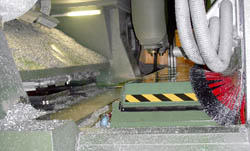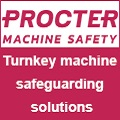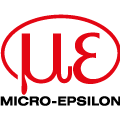
Posted to News on 20th Feb 2007, 17:09
Air knives deliver high-volume swarf removal
Airbus has found that air knives and a blower from Air Control Industries are excellent for removing high volumes of aluminium swarf from the vast machine tools used to manufacture wing components.

When machining aluminium billets down to around 5 per cent of the original mass, there is a significant amount of swarf. Apply the same scenario to Airbus wing spars, then the amount of swarf is truly significant.
One LCM (large component manufacture) machine that has a 4 x 44m long bed is designed to hold up to 18 of the 'smaller' work pieces but is also used to produce wing spars with a finished length of 10m. Some components start as 3.2t aluminium billets and come off the machine as 250kg components.
With this amount of material reduction, this three-spindle machine built by Henri Liné of Canada demands an effective means of removing the enormous volume of swarf produced.
Options considered included a vacuum process and a combination vacuum/blower technique. Both proved to be highly expensive while also presenting difficult engineering challenges with regard to making them operate efficiently, particularly relating to achieving an effective vacuum seal.
Multiple airknives
The solution to the problem, in engineering terms, turned out to be much simpler: banks of airknives powered by a single blower supplied by Air Control Industries (ACI).
Mounted in the throat of the moving gantry that houses the three machining heads are 30 airknives ranging in length from 150-1520mm. These ACI airknives blow the swarf towards the edges of the workbed into collecting gullies from where it is automatically transported into purpose-designed collection vehicles for transporting away for reprocessing.
Supplying air to these airknives is a single inverter-controlled 110kW radial blower that is housed in an acoustic cabinet, also supplied by ACI as part of the swarf removing package. Total capacity for the radial blower is 4000 CFM.
An inverter-controlled blower is required to enable air delivery to be reduced to a minimum without total shut-off to both provide a stable state appropriate for precision laser measuring of aluminium work pieces and to avoid stop/start loading of the blower and electrical system.
Peter Jarvis, Project Manger at Airbus UK, comments: "To achieve efficient and accurate machining, a lot of fine adjustment was required during set-up. ACI has been flexible and accommodating to help us accomplish our operating objectives with regard to finding the correct air delivery patterns, volumes and velocities – all to good effect."

















